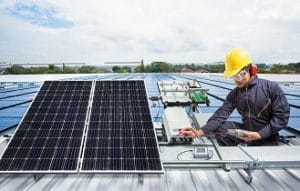 There are many different aspects and qualities of modern heat exchangers that benefit companies in many different ways. In everything from saving energy and overhead costs to streamlining overall operations and more, more companies continue to take advantage of the myriad benefits that heat exchangers offer. Among those benefits, the ability to make electrical thermal management and several other processes greener and more environmentally friendly has become one of the more important.
There are many different aspects and qualities of modern heat exchangers that benefit companies in many different ways. In everything from saving energy and overhead costs to streamlining overall operations and more, more companies continue to take advantage of the myriad benefits that heat exchangers offer. Among those benefits, the ability to make electrical thermal management and several other processes greener and more environmentally friendly has become one of the more important.
A brief glimpse of how heat exchangers work
Heat exchangers are innovative thermal management solutions that prevent electrical overheating in natural, minimal ways. Unlike traditional, HVAC-based thermal solutions, heat exchangers are designed to capture and transfer electrical waste heat continuously, preventing it from having the chance to accumulate. A heat exchanger contains an eco-friendly cooling fluid, such as water, that flows through a loop non-stop. The fluid itself is responsible for absorbing, transferring, and safely dissipating electrical waste heat, which minimizes the need for energy to keep them running.
The main green energy benefits
- Using less energy – Because heat exchangers use less energy, they reduce a company’s reliance on it, and therefore, it’s overall costs. In addition to making everything more affordable, this also means that companies can lower their environmental footprints by lowering their use of non-renewable energy sources. Because of this, heat exchangers have been notable for their contributions to several green energy initiatives.
- Creating alternate energy – When heat exchangers absorb waste heat, their purpose is to remove the heat and dissipate it somewhere safely away from sensitive electrical components. In some cases, however, heat exchangers can be designed to repurpose that waste heat for other processes that can utilize it, such as wastewater treatment. This means they not only reduce the need for energy, but also help create an alternate source of heat.
- Using no pollutants – Besides excessive energy, traditional HVAC solutions also require chemicals such as Freon and lubricating oils to operate optimally. This means they also pose a risk of these chemicals being spilled or released. By contrast, heat exchangers only use eco-friendly cooling fluids like water that don’t pose a risk to the environment and are not considered pollutants. This helps even further reduce a company’s environmental impact.
For more information about the many different green qualities of modern heat exchangers, call Noren Thermal Solutions in Taylor, TX, at 866-936-6736.







